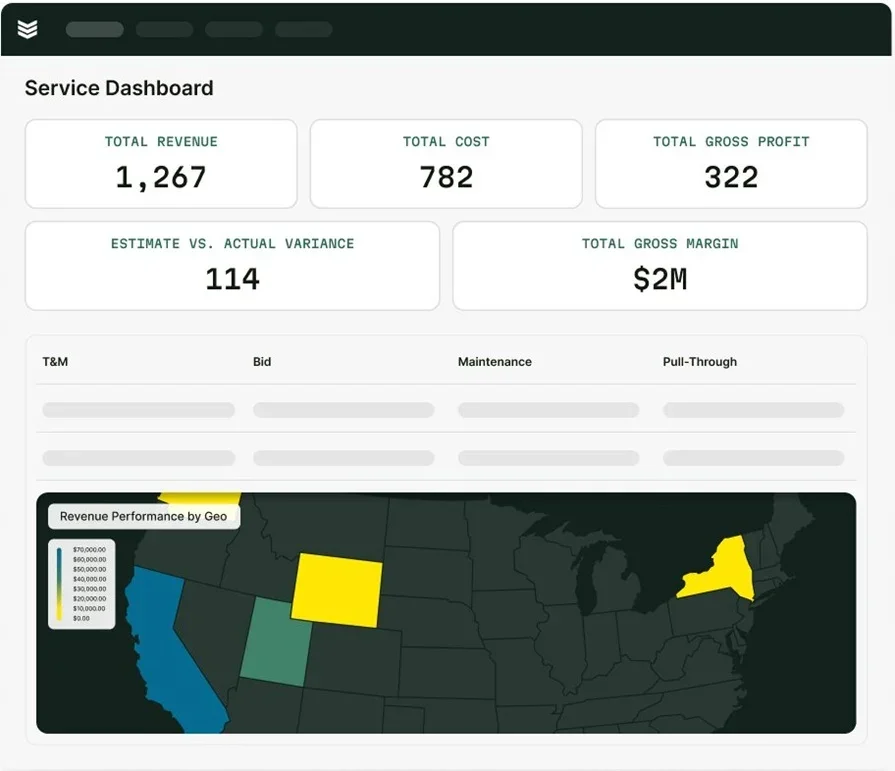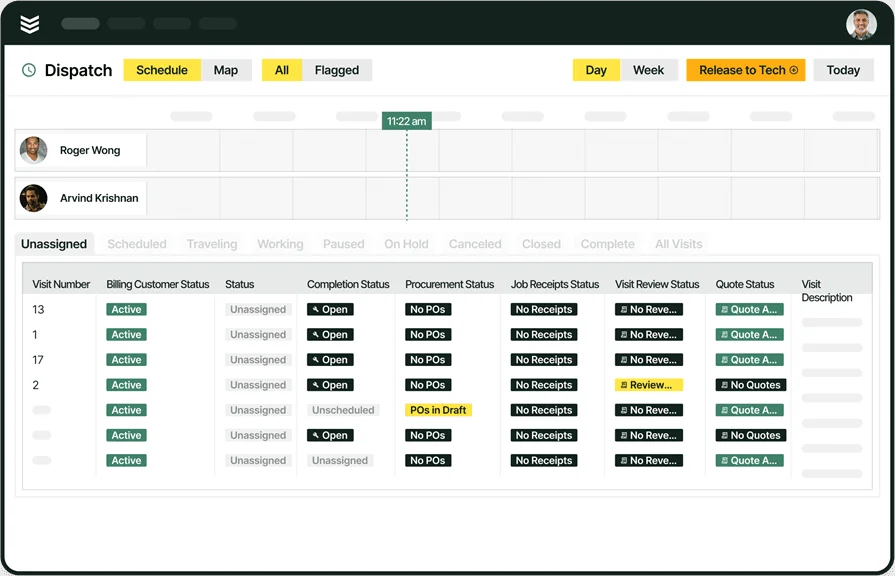When you're running a small business, every job counts. You don’t have extra office staff to handle scheduling hiccups, follow up on invoices, or chase down technicians for job updates. That’s why the right field service management software isn’t just helpful—it’s essential. It keeps your operation lean by automating job scheduling, tracking invoices, and keeping your team connected in the field.
This guide covers everything you need to know to find the best FSM software for your business, including:
- Choosing the right field service management software for your small business
- 6 key features to look for in small business field service management software
- 7 best field service management software for small businesses
- 5 benefits of using a field service management software for your small business
- 3 important small business FSM software FAQs answered
Up next, we’ll break down what small businesses should look for to get the best value and the right tools—without paying for extras they don’t need.
Choosing the right field service management software for your small business
Picking FSM software isn’t a decision to take lightly. Small businesses don’t have endless budgets or IT teams to troubleshoot complex systems. You need software that works out of the box, and has a full suite of field service tools built in to keep jobs organized, helping you run a tighter, more profitable business.
Here’s what to consider before making a decision:
- Ease of Use – Small businesses don’t have time for complicated software. With fewer resources and limited staff, the system you choose needs to be intuitive and quick to learn. Can your technicians access schedules, job details, and customer info easily, or will it slow them down and lead to wasted time?
- Scalability – Growing a small business means taking on more jobs and customers without overhauling your entire system. FSM software should allow you to add new users and expand features as your team grows—without expensive upgrades or complicated processes. Will it grow with you or hold you back?
- Automation & Efficiency – Small business owners often handle multiple roles, which makes minimizing manual work essential. Look for FSM software that automates scheduling, invoices, and customer updates. The less time spent on paperwork, the more time you have to focus on serving customers and growing the business.
- Mobile Accessibility – Small business teams are usually out in the field, not sitting in an office. Your FSM software should give technicians full access to job details, payments, and updates right from their phones—no need to call the office. Is the system truly built for mobile use, or just a desktop tool crammed into a mobile app?
- Features – When running a small business, you can’t afford to pay for features you’ll never use. FSM software should simplify core tasks like scheduling, dispatching, invoicing, and reporting—without overwhelming your team with unnecessary tools. Does it offer the features that match your needs today, with flexibility for tomorrow?

Test how your options stack up
Our scoresheet can help you compare which tool is best for small businesses.
The best FSM software brings everything together—job management, scheduling, invoicing, and reporting—so you can focus on running your business instead of chasing paperwork. Up next, we’ll break down six essential features that make the biggest impact for small businesses.
6 key features to look for in small business field service management software
Small businesses don’t have the luxury of extra office staff or deep pockets for inefficiencies. Every job, invoice, and customer interaction needs to be handled smoothly to keep things profitable. The right FSM software helps small businesses stay organized, cut down on admin work, and improve service quality. Here are six key features that make the biggest impact.
1. Scheduling & dispatching
Scheduling should be simple, not a daily headache. A plumbing company with just three techs gets an emergency call for a burst pipe across town. Without smart scheduling, they might send the wrong technician who isn’t equipped for the job, wasting time and delaying service. FSM software instantly finds the nearest qualified tech, sends them job details, and reroutes their schedule—all without a single phone call. With the right field service scheduling tools, small businesses can assign jobs based on availability and location, update technicians in real-time, and avoid costly delays.
2. CRM
Customers expect fast service and clear communication. An HVAC company servicing a local restaurant’s refrigeration system runs into a problem a month later when the unit fails again. Without a CRM, they’d scramble through past paperwork to find service history. With an FSM-integrated CRM, the technician instantly pulls up past repairs, warranty details, and notes from the last job—so they arrive fully prepared. A CRM system designed for small business contractors keeps customer records organized and ensures every tech has access to job history, leading to faster service and better relationships.
3. Invoicing & payments
Chasing payments drains time and cash flow. An electrical contractor finishes an emergency panel repair for a retail store but leaves behind a paper invoice that gets lost in the shuffle. Two weeks later, they’re still waiting for payment. FSM software with built-in invoicing lets techs generate invoices on-site, accept digital payments, and send automated reminders for overdue balances. With automated invoicing, small businesses can reduce late payments and eliminate billing headaches.
4. Reporting & analytics
Many small business owners rely on gut instinct to make decisions, but FSM software provides real data. A fire safety inspection company notices some technicians are finishing jobs much faster than others. Without data, it’s hard to know if it's efficiency or cutting corners. With dedicated software for construction reporting & analytics, businesses can track job completion times, revenue per technician, and service profitability, making it easier to adjust training or scheduling as needed.
5. Mobile access for field technicians
A small business crew is rarely in the office, so techs need job details, customer history, and work order updates on their phones. A roofing company sends a tech out to inspect storm damage, and the homeowner asks for an instant quote. Without mobile access, the tech has to call the office and wait. With FSM software, they pull up service rates, create a quote on-site, and even schedule the job—all from their phone. A field service app for technicians keeps teams connected without constant office check-ins.
6. Inventory & equipment tracking
Small businesses can’t afford to waste money on lost tools or over-ordering materials. A refrigeration repair business keeps losing track of replacement compressors, leading to unnecessary orders that tie up cash flow. With FSM software, every part is logged, assigned to jobs, and accounted for—so they only order what’s actually needed. Inventory tracking management software helps businesses prevent shortages, control costs, and ensure materials are managed efficiently.
Other valuable field service management software features for small businesses
While core features like scheduling, CRM, and invoicing are essential, some additional tools can give small businesses an extra edge. These features may not be must-haves, but they can improve efficiency, boost customer satisfaction, and make day-to-day operations run even smoother. Here are a few valuable additions worth considering.
- GPS Tracking – Keeping track of technicians in the field helps small businesses optimize routes, reduce fuel costs, and provide customers with accurate arrival times. A locksmith company handling emergency lockouts, for example, can use GPS tracking to dispatch the closest technician, cutting down response time and improving service.
- Automated Customer Notifications – Sending appointment reminders, job status updates, and follow-ups automatically reduces no-shows and keeps customers informed. A pest control business, for instance, can notify customers when a technician is en route, ensuring homeowners are prepared and reducing time wasted on rescheduled visits.
- Photo & Document Attachments – Allowing technicians to upload job site photos and reports directly into the system improves record-keeping and reduces disputes. A solar panel installation company can document completed work and share before-and-after images with clients, ensuring transparency and trust.
7 best field service management software for small businesses
The best software solutions cater to specific business needs—whether you're managing a commercial contracting team or handling residential service calls. Below are the top FSM software options, each excelling in different areas.
1. Best for small business commercial contractors: BuildOps
BuildOps is designed specifically for commercial contractors, offering an all-in-one platform for scheduling, dispatching, invoicing, and reporting. It helps small businesses manage complex projects while keeping field teams and office staff in sync. Unlike many FSM solutions that focus on residential services, BuildOps is tailored for the demands of commercial work, handling large-scale jobs, service contracts, and asset management with ease.
How Pricing Works: BuildOps offers pricing on a per-company basis, ensuring that businesses pay for the tools they actually need. The best way to understand the pricing structure and see how it fits your operation is to schedule a demo. Live demos are available weekly, or you can request one anytime for a closer look.
What Sets It Apart for Commercial: BuildOps provides advanced job costing, project tracking, and multi-location service management—features that most FSM tools lack for commercial contractors.

Want to see how BuildOps works?
Dive into our field management software for small business commercial contractors.
2. Best for small residential contractors: Housecall Pro
Image Source: Housecall Pro
Housecall Pro is a strong choice for small businesses specializing in residential services like HVAC, plumbing, and electrical work. It offers easy job scheduling, automated customer communication, and payment processing. However, it may not be the best fit for businesses that require more advanced job costing or scaling commercial service management.
How Pricing Works: Housecall Pro offers tiered pricing, with basic plans covering scheduling and invoicing, while premium options include advanced reporting and automation tools.
What Sets It Apart for Residential Services: Housecall Pro excels in customer communication, offering automated appointment reminders, online booking, and a client self-service portal.
Want to explore more? Take a look at Housecall Pro’s Features to see if it fits the needs of small residential contractors, or check out our head-to-head comparison of HousecallPro vs BuildOps.
3. Best for general contractors: Jobber
Image Source: Jobber
Jobber is a versatile FSM platform designed for general contractors who handle a mix of service calls, installations, and maintenance work. It offers job scheduling, customer management, and invoicing tools in an easy-to-use interface. However, it may not be the best choice for businesses that require advanced project tracking and scaling commercial service management.
How Pricing Works: Jobber provides multiple pricing tiers, starting with basic scheduling and invoicing features, while higher plans include automation and reporting tools.
What Sets It Apart for General Contractors: Jobber simplifies client communication with automated follow-ups and allows contractors to track job progress with a mobile-friendly dashboard.
Check out Jobber’s FSM Software to learn how they help general contractors.
4. Best for lead management: Workiz
Image Source: Workiz
Workiz is a great choice for small businesses that rely heavily on inbound leads and sales-driven service appointments, such as locksmiths, cleaning services, and appliance repair businesses. It integrates lead tracking, call management, and automated follow-ups to help businesses convert inquiries into booked jobs. However, it may lack some of the advanced operational features that contractors with long-term projects require.
How Pricing Works: Workiz offers subscription-based pricing, with plans that scale based on the number of users and included features.
What Sets It Apart for Lead Management: The built-in call tracking and lead automation tools help businesses respond to inquiries faster, reducing missed opportunities.
Looking to improve your lead tracking? See how Workiz lead management software can help.
5. Best for scalability: Service Fusion
Image Source: Service Fusion
Service Fusion is designed for small businesses looking to scale without overcomplicating operations. It offers features like job scheduling, GPS tracking, and invoicing while maintaining a user-friendly interface. Unlike more complex platforms, it provides growing businesses with the tools they need without requiring a steep learning curve or enterprise-level pricing.
How Pricing Works: Service Fusion offers flat-rate pricing with no per-user fees, making it a cost-effective option for businesses planning to expand their team.
What Sets It Apart for Scalability: The combination of unlimited users, cloud-based access, and integration with QuickBooks makes it a solid choice for businesses preparing to scale.
Expanding your business? See if Service Fusion’s field service management software fits your growth needs.
6. Best for ease of use: Kickserv
Image Source: Kickserv
Kickserv is designed for small businesses that want an easy-to-use FSM solution without a steep learning curve. It offers scheduling, invoicing, and customer management in a simple, intuitive interface. While great for small teams, it may lack some of the advanced reporting and automation features that larger businesses require.
How Pricing Works: Kickserv offers a free plan for solo operators, with paid plans that add more users and advanced features like automated follow-ups and job costing.
What Sets It Apart for Ease of Use: Kickserv’s drag-and-drop scheduling and mobile-friendly interface make it easy for field teams to update job statuses and invoices on the go.
Looking for a straightforward FSM solution? See if Kickserv’s software is easy enough to use for your business.
7. Best for scheduling & dispatching: Service Autopilot
Image Source: Service Autopilot
Service Autopilot is built for businesses that rely heavily on efficient scheduling and dispatching, such as landscaping, cleaning services, and home maintenance companies. It automates job assignments, optimizes technician routes, and integrates with GPS tracking. However, businesses needing more in-depth commercial project tracking might find it limited.
How Pricing Works: Service Autopilot uses a tiered pricing model, with higher plans offering advanced automation, CRM tools, and route optimization features.
What Sets It Apart for Scheduling & Dispatching: The system automatically assigns jobs based on technician availability, location, and skillset, reducing downtime and maximizing efficiency.
Need better scheduling and dispatching? Take a look at Service Autopilot’s software to see what it offers.
5 benefits of using a field service management software for your small business
Running a small business means juggling job schedules, customer communications, and payments—all while trying to keep operations running smoothly. Without the right tools, even minor inefficiencies can lead to missed appointments, lost revenue, and frustrated customers. Field service management software helps small businesses stay organized, work more efficiently, and provide better service. Here’s how:
1. Fewer scheduling mistakes and missed appointments
Last-minute cancellations and double bookings can throw off an entire day’s work. A small HVAC business with only three technicians can’t afford to have one sitting idle because of a scheduling mix-up. FSM software automatically syncs job assignments, prevents overlaps, and sends automated reminders to both customers and technicians. With real-time updates, rescheduling a job or filling last-minute openings becomes a simple task, keeping the workflow uninterrupted.
2. Faster invoicing and payments
Chasing down payments can be a headache, especially for small businesses that rely on steady cash flow. A plumbing contractor who completes an emergency pipe repair shouldn’t have to wait weeks for a check in the mail. FSM software allows technicians to generate and send invoices on-site, giving customers the option to pay instantly through credit cards or digital payments. This eliminates billing delays and improves cash flow, ensuring that small businesses get paid on time.
3. Better communication between office and field teams
Miscommunication leads to wasted time and frustrated customers. A small electrical service company, for example, might dispatch a technician for a breaker panel replacement—only for the tech to arrive without the right parts because the job details weren’t updated. FSM software bridges the gap between the office and field teams by providing real-time job updates, customer history, and work orders directly through a mobile app. This ensures every tech arrives fully prepared, cutting down on wasted trips and improving job efficiency.
4. Improved customer satisfaction and retention
Small businesses thrive on repeat customers and word-of-mouth referrals. A pest control company that doesn’t follow up on past treatments risks losing clients to competitors. FSM software automates follow-ups, sends appointment reminders, and allows businesses to keep track of service history—all in one place. When customers receive timely updates and seamless service, they’re more likely to return and recommend your business to others.
5. More efficient job tracking and reporting
Knowing which services bring in the most revenue helps small businesses make better decisions. A refrigeration repair company might suspect that emergency calls are more profitable than routine maintenance, but without proper tracking, they’re just guessing. FSM software provides detailed reporting on job types, technician efficiency, and revenue breakdowns, giving business owners the data they need to adjust pricing, allocate resources, and plan for growth.
Deep Dive
Need to learn how to optimize your field service management process for small businesses? Check out our complete guide to field service management for actionable steps you can take today to start seeing efficiency improvements tomorrow.
3 important small business FSM software FAQs answered
Running a small business in the field service industry means balancing job scheduling, customer management, and invoicing—all while keeping overhead costs low. Field service management (FSM) software helps small businesses streamline these tasks, but many owners still have questions about its value, cost, and who benefits most. Here are the answers to the most common questions.
1. What is unique about field service management software for small businesses?
FSM software for small businesses prioritizes ease of use, mobile access, and automation to handle daily tasks without extra admin staff. Unlike enterprise tools built for large-scale operations, small businesses need features that simplify scheduling, invoicing, and real-time job tracking.
2. How much does small business field service management software cost?
Pricing varies based on business size and features. Most FSM software offers tiered pricing, with basic plans starting at $30-$50 per month, while more advanced plans with automation and reporting range from $100-$300 monthly. Some charge per user, while others provide flat-rate pricing.
Deep Dive
If you’re shopping around for field service management software, we have a complete guide on how to compare your options, what questions to ask in a demo, what affects the price of software most, and how to weed out companies that are looking to sell you software and then bail without helping you through implementation. Read up on our tips before you start comparing your options.
3. What types of small businesses need field service management software?
FSM software is essential for service-based businesses that manage appointments and field teams. This includes HVAC, plumbing, electrical, pest control, landscaping, appliance repair, and cleaning services. Any small business that schedules jobs, dispatches technicians, or collects payments on-site benefits from FSM tools.
Finding the right field service management software can transform how small businesses operate—streamlining scheduling, improving communication, and ensuring faster payments. While many FSM tools offer basic features, not all provide the full suite of automation, reporting, and scalability that growing businesses need.
That’s where BuildOps stands out. Unlike other solutions that may lack advanced job costing, commercial service management, or real-time field updates, BuildOps brings everything together in one powerful platform. From scheduling and invoicing to reporting and CRM, it’s designed to help small businesses stay efficient, profitable, and ahead of the competition.

See if BuildOps is a good fit
See how BuildOps can help you run a tighter, more profitable operation.






